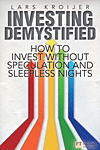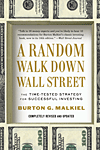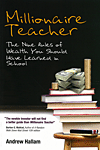The best books on investing for beginners
Four of the best books on passive investing, from a very simple introduction to an in-depth analysis.

Get the latest financial news, insights and expert analysis from our award-winning MoneyWeek team, to help you understand what really matters when it comes to your finances.
You are now subscribed
Your newsletter sign-up was successful
Want to add more newsletters?

Twice daily
MoneyWeek
Get the latest financial news, insights and expert analysis from our award-winning MoneyWeek team, to help you understand what really matters when it comes to your finances.

Four times a week
Look After My Bills
Sign up to our free money-saving newsletter, filled with the latest news and expert advice to help you find the best tips and deals for managing your bills. Start saving today!
A guide with personality

Investing Demystified: How to Invest Without Speculation and Sleepless NightsBy Lars KroijerPearson, £19.99
If you want an introduction to investing with both substance and personality, then Investing Demystified: How to Invest Without Speculation and Sleepless Nights might be the book for you. Although the book is written by Lars Kroijer, a former hedge-fund manager who clearly believes that skilled investors can beat the market, it does not recommend complex investments for regular investors. Instead, he advocates a sensible approach based around simplicity, diversification and low cost.
You'll find the same points in plenty of guides to investing for beginners (such as Andrew Hallam's book, below), but Kroijer also spends time discussing "black swan" events, such as a repeat of the 2008 financial crisis. He also talks about what the financial services industry could do to make investing even more straightforward for investors. While both sections could have been longer, the fact that they are in the book at all makes it stand out from the crowd.
MoneyWeek
Subscribe to MoneyWeek today and get your first six magazine issues absolutely FREE

Sign up to Money Morning
Don't miss the latest investment and personal finances news, market analysis, plus money-saving tips with our free twice-daily newsletter
Don't miss the latest investment and personal finances news, market analysis, plus money-saving tips with our free twice-daily newsletter
Advanced but accessible

A Random Walk Down Wall Street: The Time-Tested Strategy for Successful InvestingBy Burton G MalkielWW Norton and Company, £12.99
For an alternative with a bit more theory, try A Random Walk Down Wall Street by Burton Malkiel, which is now in its 11th edition. As the name suggests, this book argues that markets are unbeatable and that you should focus on diversification and passive investing. We wouldn't necessarily agree with that, but Malkiel writes persuasively, making investment theory accessible for the average reader.
One of the things we like is that Malkiel is honest enough to present evidence that suggests markets get it wrong sometimes. Indeed, a lot of the book is devoted to some of the biggest financial bubbles. He also concedes that buying shares of firms with low price/earnings (p/e) ratios seems to produce stronger returns. Malkiel then looks at how psychology can skew markets. The only negative, apart from the overall conclusion, is that the advice about specific products is geared to readers in the US.
Cutting risk

Smarter Investing: Simpler Decisions for Better ResultsBy Tim HaleFT Publishing, £24.99
Smarter Investing: Simpler Decisions for Better Results by Tim Hale also recommends a strategy based around passive investing. However, unlike the previous books, Hale's focus is on reducing risk, rather than necessarily getting the best return. A large portion of the book is devoted to bonds and other assets, such as real-estate investment trusts, that can help diversify your portfolio. To back up his arguments he provides a huge amount of historical data, including the simulated risk and return for each of his six suggested portfolios.
Hale's book is certainly comprehensive and, unlike many books of this type, it has the advantage of being UK-focused. He also provides a large amount of detail. Some people may find the book a little too detailed in fact, and his writing style too dry. However, his list of 20 investment-related tips will be extremely useful for those who have a limited amount of time and want to absorb key lessons quickly. He also includes a useful appendix at the end about how to set realistic financial goals that will enable the reader to retire comfortably.
An introduction for non-investors

Millionaire Teacher: The Nine Rules of Wealth You Should Have Learned in SchoolBy Andrew HallamPublished by John Wiley and Sons (£11.99)
Many people don't have the time or enthusiasm to try to master investing and just want a simple guide that tells them what to do and what to avoid. Millionaire Teacher: The Nine Rules of Wealth You Should Have Learned in School by Andrew Hallam fills this role. Hallam's basic philosophy is that it's possible to accumulate a large amount of wealth, even if you work in a career where you don't earn a high salary, such as teaching. All you have to do is to cut down on spending, follow a simple investment strategy based on indexed stock and bond funds, and avoid tempting "get rich quick" schemes. You may not want to go to the lengths that Hallam did he saved money by "flat sitting" in unheated apartments and cycling 35 miles to school during the Canadian winter (even he calls the latter decision "boneheaded"). We think he takes scepticism of all active management a bit too far, essentially calling anyone who thinks that they can beat the market liars. However, if you have a very limited amount of time or enthusiasm for managing your finances, his approach might be worth considering. Overall, it's a useful motivational tool to get your financial house in order.
Get the latest financial news, insights and expert analysis from our award-winning MoneyWeek team, to help you understand what really matters when it comes to your finances.

-
 How a ‘great view’ from your home can boost its value by 35%
How a ‘great view’ from your home can boost its value by 35%A house that comes with a picturesque backdrop could add tens of thousands of pounds to its asking price – but how does each region compare?
-
 What is a care fees annuity and how much does it cost?
What is a care fees annuity and how much does it cost?How we will be cared for in our later years – and how much we are willing to pay for it – are conversations best had as early as possible. One option to cover the cost is a care fees annuity. We look at the pros and cons.